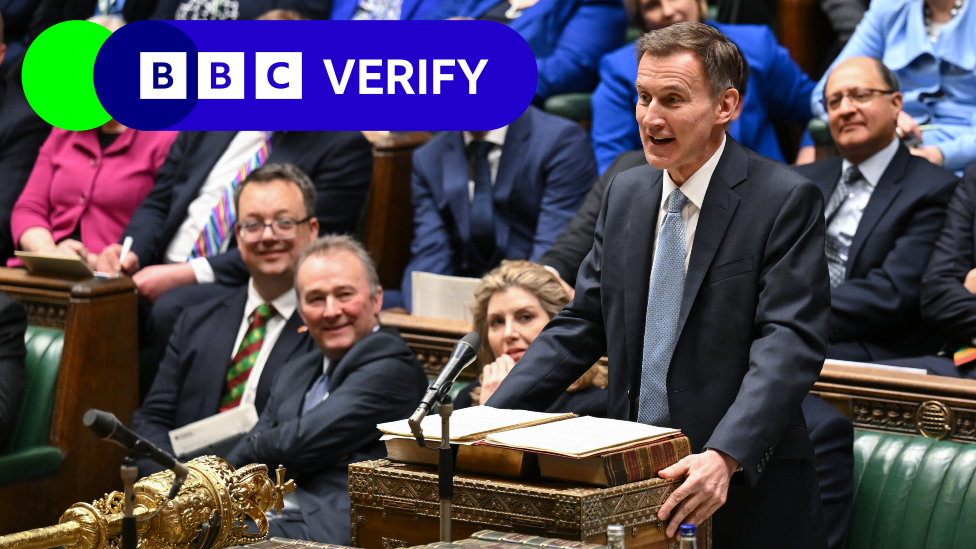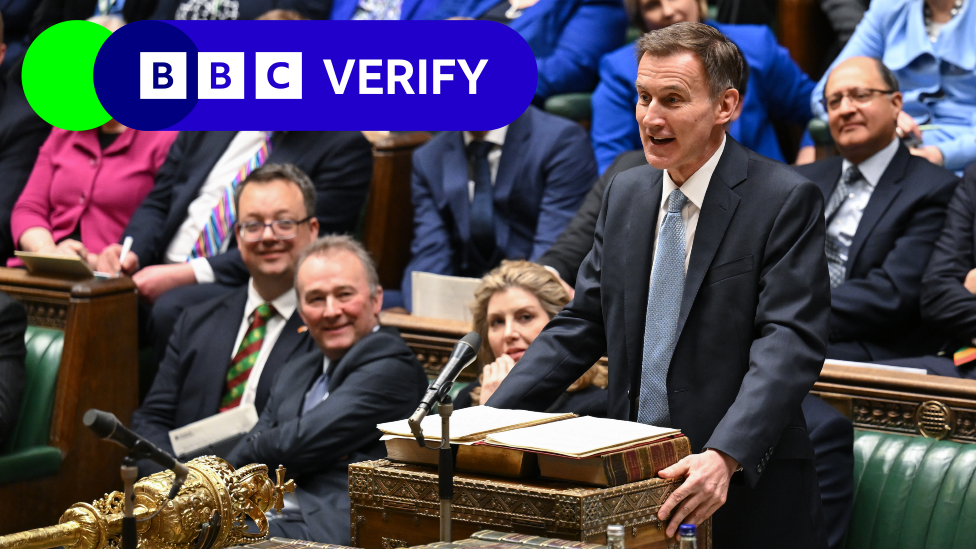
Chancellor Jeremy Hunt has set out his Budget which he said would “put the country back on the path to lower taxes”.
Mr Hunt announced a cut to National Insurance but the Labour leader Keir Starmer said living standards under the Conservatives had taken “an unprecedented hit”.
We’ve looked at their competing claims.
‘Since 2010, we have grown faster than Germany, France, and Italy’ – Jeremy Hunt
The UK economy grew faster than Germany over the past year, but not France or Italy.
But Mr Hunt is right to say that for the whole period that the Conservatives have been in power, the UK has grown faster than all three of them.
The UK’s Gross Domestic Product (GDP) – a widely-used measure of the size of the economy – has grown by 21% since 2010. In comparison, Germany’s GDP grew by 18%, France’s by 15% and Italy’s by 4%.
However, if we look at GDP per person, which excludes the effect of the growing population, Germany has actually performed better than the UK during that period.
‘The highest tax burden for 70 years’ – Keir Starmer
Mr Starmer is right – the overall level of taxation last year was the highest for more than 70 years.
And it is forecast to get higher.
The Office for Budget Responsibility (OBR) – the independent body which makes forecasts for the government – predicts that it will collect 37.1p of every pound generated in the economy in 2028-29.
That would be the highest level in 80 years.
Remember, this is the total tax take, not just personal taxes, national insurance or VAT.
It also includes taxes on, for example, property sales, holiday lets and companies.
‘Debt is falling, in line with our fiscal rules’ – Jeremy Hunt
The chancellor’s fiscal rule is that debt should be on track to fall in five years, and the OBR does forecast that this will happen.
But it does not mean debt is falling now or in the next few years.
Mr Hunt quoted the OBR forecast in his Budget speech. It predicts debt, excluding Bank of England debt, will be higher in the next three years, unchanged in the fourth year and lower in 2028-29.
The prime minister previously got into trouble with the statistics regulator for claiming that debt was falling when he meant it was predicted to fall in five years.
Sir Keir Starmer criticised the government’s record on debt
The government has ‘maxed out the nation’s credit card’ – Keir Starmer
The Labour leader criticised debt levels by referring to the “nation’s credit card”.
Many commentators have warned that it is misleading to refer to the country’s finances in the same way as you would talk about a household’s finances.
A good example comes from a review of the reporting of things like government spending and borrowing, which the BBC commissioned from Sir Andrew Dilnot, former chair of the UK statistics regulator.
“Household analogies are dangerous territory, intensely contested, and can easily mislead,” he warned.
Key differences include: “that states don’t tend to retire or die, or pay off their debts entirely”, he said.
On the question of the UK’s debt, it’s expected to be 97.6% of GDP this year.
Looking across the G7 – a group of advanced economies – debt is well over 100% of GDP for Canada, France, Italy and the US.
Japan’s government debt is currently more than 260% of its GDP, but Germany’s debt is considerably lower than the UK’s.
‘Food prices are still 25% higher than two years ago, rents up 10%’ – Keir Starmer
You can check both those figures with official data from the Office for National Statistics.
Although the rate at which food prices are rising has been slowing, they are still going up.
The latest figures for January this year showed that food prices were indeed 25% higher than they had been in January 2022.
And the ONS also produces an index of private rental prices, which shows that rent in the UK was up 11% in January compared with January 2022.
‘The average earner in the UK now has the lowest effective personal tax rate since 1975’ – Jeremy Hunt
The Treasury says he was referring to the amount of National Insurance (NI) and income tax paid by an average, full-time, single earner – with no children and who doesn’t get benefits.
The Resolution Foundation think tank agrees with the calculations for this specific person.
But you can find winners and losers from any set of tax changes.
If you look at all earners then, on average, they are paying more.
The Institute for Fiscal Studies says that overall for every £1 the government has cut from NI, it has taken £1.30 with its freezes to tax thresholds over the last few years.
